by Alison MacLeod
I speed along the A27, past the green flanks of the South Downs. There should be one of those AA signs for wayward writers like myself saying: ‘Rural Idyll, 5 miles’ or ‘Pastoral Dream, next right’.
Right, it is.
I rumble up a long farm lane between high hedges, jumpy rabbits and skittering pheasants. The day, though late September, trumpets itself like the last blast of summer. It’s hot, dreamy, a gift – and the first day of the four-day International Small Wonder Short Story Festival, a festival dedicated entirely to that exquisite and sharp-eyed thing that is the short story.
Joseph O’Connor dubbed it a ‘quiet bomb’. Pat McCabe called it an ‘an explosion of truth’. A great story is a thump of life to the chest. The explosion, that little intensity, moves you to tears, laughter, or quiet wonder. To a sense of the uncanny or even the miraculous. It’s a brush with life-force itself. Immediate. Visceral. It’s unfolding live before your eyes. That’s the art of it. That’s what it takes.
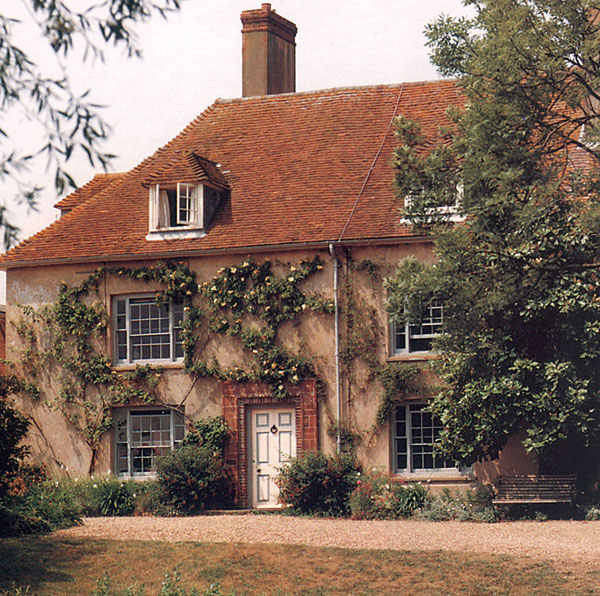
Flannery O’Connor put it very simply: ‘Meaning is what keeps the short story from being short.’ I like Flannery. Her stories soar but her feet remain firmly on the ground. It’s also typical of her to say, so matter-of-factly, that ‘There is a certain grain of stupidity that the writer of fiction can hardly do without, and that is the quality of having to stare, of not getting the point at once.’ I park my car next to the milking machine at the back of the converted barn. I’m early for my event. In other words, I get to stare.
At the vast cow pond, the waxy leaves of the water-lilies gleam, and a life-size, weathered sculpture of a sleeping woman floats above the bank. Beyond it, the walled garden is an impressionist’s wash of colour. I’ve been coming to Charleston, the historic home where the festival takes place, for years. Now, today, before my reading, I’ll be fed and watered at the same table where the painter Vanessa Bell fretted over the day’s menu for her guests. I’ll be shown to the same loo where Vanessa’s sister, Virginia Woolf, once sat, gathering her words as the cows mooed their indifference. Virginia Woolf’s seat. A rickety pull-chain. A bit of day-dreaming. For a writer, really it doesn’t get much better than that.
Charleston – the setting for the Small Wonder Festival – is the former home of the artists Vanessa
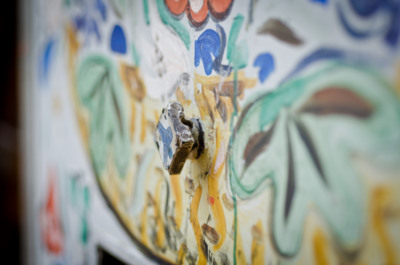
Bell and Duncan Grant, and was a favourite retreat away from London for luminaries like E.M. Forster, Roger Fry, Maynard Keynes and Lytton Strachey. Lucky old luminaries. Inspired by Italian frescoes and the Post-Impressionists, Bell and Grant decorated the doors, walls, tables, chairs and beds. They improvised lampshades from painted colanders. The house is eccentric, lovely and a tribute in many ways to pleasure itself – to colour, bodies, light, fruit, flora and earthly delight. Of course the Bloomsbury group would later become known for their explorations of free thought, human consciousness, new artistic forms, and free love. Who was it who said that they lived in squares (in London) and loved in triangles? Of course there was mess and grief and complication, but it’s hard not to admire their efforts to live life fully. Peering in and out of their windows at Charleston, it seems as if they refused to squander a single day, a single view, canvas, wall or tabletop.
I’ve arrived with my great friend, the writer Adam Marek. Neither of us lives on a square or is loving in a triangle, but we’re both big on pleasure. As the audience begins to rumble up the farm road, we head for the tea room and order scones with clotted cream. Then, with the first course in our tums, we head to the kitchen (the green room) where more food will be laid out on platters with all the colour and deliciousness of a Vanessa Bell still life. Writers will come and go around the table as the Small Wonder Festival unfolds.
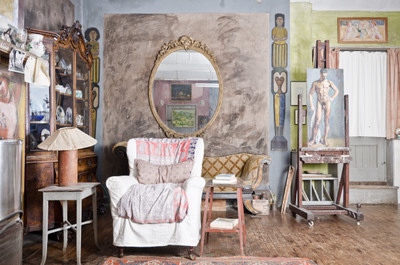
If the scene around that big square table were a time-lapse film, Adam and I would morph into
Robert Coover and Yiyun Li. Yiyun would transform, split-screen-style, into Sarah Waters, Kate Pullinger, Kate Clanchy and Naomi Alderman. Polly Samson would move beautifully in and out of shot. In noises off, you’d hear Damian Barr’s wild, Wilde-ian laughter. You’d see his black frock coat hanging over the back of a chair. You’d hear the 2011 BBC National Short Story judges laugh and gabble, released at last from the weight of decision-making. Rachel Cusk and Janice Galloway will reach for a slice of quiche that will be eaten by Ali Smith and Colin Grant. I’ll manifest again to chat about the levitations of St Theresa with Annalena McAfee, instrumental music with the wonderful Ben Watt, and Victorian conjuring tricks with Prof. Denis Noble. And so on. It’s a moveable feast of writers and thinkers – between that cosy old kitchen and the Small Wonder stage in the magnificent, converted barn.
Even in the barn, it’s summer still. Pots of pink cyclamen, lavender and ferns line the stage and cluster brightly around the lectern. At stage-right, a tree – a maple? a young oak? – grows, reaching towards the rafters. Chinks of daylight wink. A swallow hops in and out of the eaves. You can hear the metallic coughs of pheasants. The cows heckle. The churring of the milking machine interferes with the mics and sends up spooky interference just in time for Kate Clanchy’s reading of her brilliant, Bronte-inspired ghost story. Naomi Alderman’s dark little number has the audience, literally, on the edge of the new auditorium seats. (Both stories, incidentally, appear in the brilliant new Asham Award collection, ‘Something Was There…’.) We also listen, fascinated by Sarah Waters’ reading of Graham Greene’s grittily urban ghost story, ‘A Little Place off the Edgeware Road’.
Later, Tom Vowler delivers a passionate homage to the short story form, and the cows stop heckling.
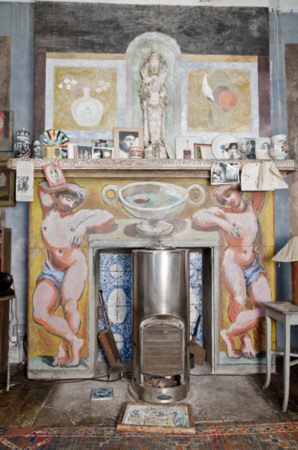
John Crace reads a hilarious ‘digested’ version of Du Maurier’s Rebecca and moves seamlessly into a stark and profound account of his experiences of depression (from his new book Vertigo). Polly Samson reads from her wonderful collection Perfect Lives, and she and I discuss, quite merrily on stage, the imperfect nature of real happiness. Rachel Cusk, Janice Galloway and Colin Grant, chaired by Sigrid Rausing of Granta, explore the raw stuff of their own lives in a daring discussion of memoir-writing. Tom Rachman and Annalena McAfee read from their timely new works about the glory days and fading fortunes of the newspaper world.
As the weekend spools away, I rumble back and forth along that long farm lane. The nights are cold. The mornings are golden and syrupy. Leaves on that tree on stage begin to turn to crimson and gold.
My personal 2011 Small Wonder highlights:
1. The honour of reading my story ‘The Heart of Denis Noble’ with the very real Prof. Noble himself on the stage. I was fascinated by his discussion of metaphor and science in this, the Litmus event. It was another great honour to share the stage with Maggie Gee. Her novel The Burning Book was a touch-paper inspiration for me when I was first discovering contemporary fiction.
2. Polly Samson’s reading from ‘The Egg’ and especially the scene in which a character suddenly finds herself fellating a statue. Delicious comedy. Polly also read an account of the moment when a woman looks down on the naked body of her husband and suddenly knows what it will be to see his body dead. Stunning prose.
3. Ali Smith’s effervescent discussion of the stories of Muriel Spark and their ‘strangely winged’ power; she spoke so lucidly of the ‘aliveness’ and ‘brevity’ of the short story form and, in the yoking of those two qualities, its deep connection to ‘mortality’.
4. Juliet Stevenson’s reading of Woolf’s little known story‘Mrs Dalloway in Bond Street’.
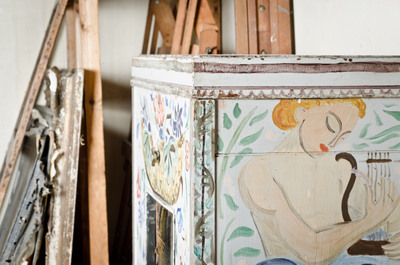
Pitch-perfect. A privilege to hear. Sylvestra Le Touzel also read Woolf’s ‘The New Dress’. Again, a remarkable reading of a remarkable story.
5. The Small Wonder finale event: the stories of the Arabian Nights, two of which were re-told by Hanan Al-Shaykh, a Lebanese writer living in London. Rich, ribald, and gripping. She has a beautiful voice. Hanan recalled that, as a child, her friend’s father had a copy of the banned volume but that it was locked up in a cabinet with other strange artefacts such as elephants’ tusks. Her friend told her that ‘Anyone who reads it to the last page will drop dead!’
It’s Joseph O’Connor again – that ‘quiet bomb’. Stories are secret fuses to the extraordinary. And it seems very fitting to end Small Wonder 2011 on the wonder-tales of Scherezade.
6. After the final event – presto! – Ian McEwan suddenly appeared at the kitchen table in the green room. The chat carried on till late. Conversation doesn’t get much better.
The company of the great writers and great audiences at Small Wonder reminds me of what a privilege it is to send one’s work out into the world and to have it received; for your work to meet and become a part of the lives of others. And of course, that’s even better than sharing a loo across space-time with Virginia Woolf.
*
Charleston House and garden are open Wednesday to Saturday 1pm – 6pm and on Sunday from 1pm – 5.30pm until 30th October when it closes for winter. It will reopen on 28th March 2012.
*
THRESHOLDS would like to thank The Sunday Times Magazine’s Fast Fiction site for allowing us to re-print a version of Alison’s article.